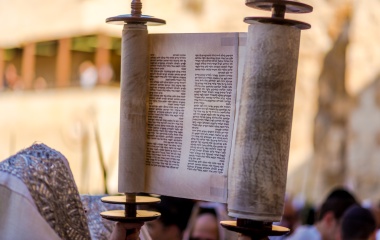Last year and this, I have had the pleasure of learning and teaching Pirkei Avot. There is no better way to learn than by teaching and no greater way to clarify one’s thoughts than by writing. In that vein I present some introductory thoughts on Pirkei Avot that I hope you find of interest. In the section entitled Points to Ponder I include some questions for further discussion. Any and all feedback would be greatly appreciated.
I could not think of a better day to share these thoughts than today, the 28th of Sivan, the 22nd yahrzeit of my dear mother, Ruth Kelman, Rachel bat Chaim v'Yetta z”l who, together with my father z"l, whose yahrzeit we observe next week, in so many ways embodied the teaching of Pirkei Avot. Yehi Zichram Baruch.
Pirkei Avot is an outlier. Sixty-two of the 63 tractates of the Mishna are primarily legal texts, putting into writing the laws of the Torah. On the other hand, the focus of Pirkei Avot is character development, moral growth, and lessons for daily living. It is the foundation upon which the law is built, a fulfilment of the rabbinic teaching that derech eretz kadma leTorah (Vakiyra Rabba 9:3).
The term derech eretz is not easily translatable. It literally means “the path of the land” and might best translate as “the ways of the world.” Torah, as a guide to life, requires that we have a deep understanding of the world around us. This is apparently how Rabbi Shimshon Rafael Hirsch understood the term, arguing that derech eretz requires one to attain worldly wisdom. At the same time, derech eretz would undoubtedly include such basics as good manners, proper etiquette, great interpersonal relations, and most important, ethical excellence. If Torah is the derech, the path to live by, derech eretz is the building of that path, enabling us to take that path. “Darchei Hashem, the paths of the Lord, are yesharim [1], straight; tzadikim, the righteous, can walk on them, while sinners stumble on them” (Hosea 14:10).
The Tiferet Yisrael, in his introductory comments to Pirkei Avot, notes that the 26 generations of mankind that preceded the giving of the Torah were the time to learn derech eretz, i.e. the messages and lessons of Prikei Avot, thereby enabling us to merit the receiving of the Torah. Just as the stories of the Avot and Imahot (and those of the first 20 generations) must be studied and learned from before we are able to receive the Torah with its myriad legal laws, so, too, Pirkei Avot must be studied and studied some more before turning to the legal sections of the Mishna.
Unlike all other tractates (and sidrot of the Torah) which derive their names from the opening few words, the name Avot appears nowhere in the tractate. Rather, the Tiferet Yisrael notes that this name was specifically chosen, because “all the wisdom, mussar, instruction, that is recorded in all the books of the Sages of Israel and nations of the world is all included in this tractate, for those who examine its words carefully”. Every important message of our tradition has its basis in Pirkei Avot!
As the foundational masechet of the Mishna, one that contains “all wisdom”, we begin Pirkei Avot noting the transmission of the Torah from Moshe at Sinai through to the Anshei Knesset Hagedolah, some 1,000 years later.
Linking the teaching of Avot to Sinai is especially important, specifically in reference to Pirkei Avot. Rav Ovadiah MiBartenura explains that there is little need to teach the transmission of Torah from Sinai regarding the mitzvah of kriat shema, as that is obvious. All who observe the religious rituals of Judaism do so due to their belief in a divine lawgiver. One who keeps kosher, eats matzah on Pesach, fasts on Yom Kippur, and prays daily is cognizant that these laws originate in the Torah given at Sinai.
However, this is not the case regarding the ethical teachings of Pirkei Avot, many of which are shared in one form or another with other religions and cultures. It is rather easy to see them as good advice, advice we should wisely heed, but lacking the authority of actual Biblical law. Hence, the need to emphasize that the teachings of Pirkei Avot have their basis in the Torah given at Sinai, no less than the “religious” laws of the Torah.
With Pirkei Avot being of primary importance, and with one apt to dismiss its importance, we are left wondering why in editing the Mishna, Rebbe Yehuda Hanassi does not begin the Mishna with Avot. I hope to discuss this in our next posting and in the interim would love to hear your thoughts.
[1] As the Netziv explains in his powerful introduction to sefer Breisheet, yashar refers to our interpersonal relations while tzadik refers to those between man and G-d. Yet while one can be a yashar and not a tzadik, the Netziv explains that G-d "cannot tolerate" those who are tzadikim yet not yesharim, and it was because of such people that G-d allowed the Temple to be destroyed and the Jewish people exiled. (see here for both the original Hebrew and an English translation)
Points to Ponder
**In light of the The Tiferet Yisrael’s understanding of the name Avot, how are we to understand the teaching of our Sages, “If they say to you, there is Torah in the nations, do not believe; wisdom in the nation, believe” (Eicha Rabba 2:17)?
**Why do you think that the increase of observance we have witnessed over the past number of years has focused almost exclusively on the rituals of Judaism and less on our monetary transactions? Or, to phrase it slightly differently, why more emphasis on Orach Chaim and Yoreh Deah and less on Choshen Mishpat?


